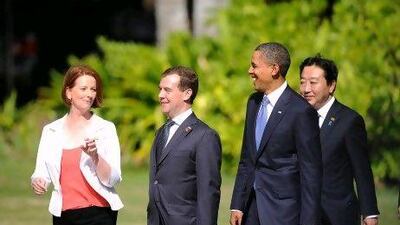For grand strategy buffs, this has been quite a month, with several events looking like the kind of turning points that will fascinate future historians.
Road to ruin or recovery?
Euro Zone The National charts Europe's struggles as it attempts to through of financial crisis. Learn more
Capturing the most media attention has been Europe's eroding credibility, with its paralysed institutional response to the continuing financial crisis making ever more fanciful the notion of a G3 world, in which the EU could compete as a political and economic equal with the US and China.
But the most interesting new chapters in the story - in economic, political and security terms - have been written in Asia and the Pacific. The subtext in most cases has been the recurring nervousness about China's rise. Recent weeks have witnessed some significant institutional and policy changes, as well as fundamental strategic repositioning, by the region's major players.
First, at this month's Asia-Pacific Economic Cooperation (Apec) summit, hosted by Barack Obama, the US president, in Hawaii, Japan announced its intention to join the US and eight other countries, including Australia, Chile, and Singapore, in negotiating the Trans-Pacific Partnership (TPP).
The TPP would create a free-trade area 40 per cent larger than the EU - and much bigger still if it ultimately embraced all Apec members, further consolidating Asia's global economic primacy. (While some have been attracted to the idea of confining a new trade partnership to America's closer friends and allies, thereby excluding China, it is difficult to see how this would serve any constructive purpose.)
Second, the leaders of every major country in the region - including for the first time the US and Russia - met this month at the East Asia Summit, hosted by Indonesia in Bali, to discuss security and economic issues.
This is reported to have resulted in some lively exchanges on the issue of Chinese territorial claims in the South China Sea.
With India also a key member, this newly consolidated grouping - the only meeting that brings together the region's most senior government officials with an open-ended agenda - is set to become by far the most effective of the alphabet soup of Asia's regional and sub-regional organisations.
Third, in the run-up to the East Asia Summit, the Australian prime minister Julia Gillard announced she would move to relax her country's long-standing prohibition on uranium sales to India while it remained outside the Nuclear Non-Proliferation Treaty.
Given international acceptance of last year's US-India bilateral nuclear deal Australia simply had no remaining policy leverage. Whatever the reasons behind it, the policy change will remove a major irritant from bilateral relations and facilitate much closer political and strategic cooperation in the Indian Ocean. That is a point that will not be lost on China's rulers.
Fourth, and most significant, was Mr Obama's Canberra speech en route to the East Asia Summit.
More wide-ranging and substantial than the usual bilateral bromides, he announced his "deliberate and strategic decision" to have the US play a "larger and longer-term role" in shaping the Asia-Pacific region as it draws down its forces in Afghanistan and the Middle East.
He called US presence and missions in the Asia-Pacific region a "top priority," to be insulated from any defence spending cuts. Adding substance - and striking symbolism - to the rhetoric, Mr Obama and Ms Gillard announced the creation of a training base in northern Australia for 2,500 US Marines, a significant new capability within easy reach of both South East Asia and the Indian Ocean.
Mr Obama's Canberra speech was careful to emphasise that the US wants a cooperative, communicative relationship with China. But he was equally clear in stating that Washington would "preserve our unique ability to project power" and issued some sharp messages to China about upholding international norms and respecting human rights.
All of this has already generated some predictably acerbic reactions from China's state-owned media. Clearly, Australia and other US allies face some interesting times ahead as we juggle our long-standing alliance with economic imperatives.
It is important that Australia and others in the region do push back against the kind of hard Chinese nationalist sentiment that has rightly jangled nerves in the South China Sea and, in their defence policy and alliance relationships, hedge against worst-case scenarios, however unlikely they may appear now.
China knows perfectly well where Australia, the US, and others stand; its leaders understand these countries' alliance relationships, even as they rail against them, and have their own compelling reasons to continue to trade with them.
Tomorrow's exclusives tonight:
Industry Insights e-newsletter Stay ahead of the pack and get the pick of the premium Business content straight to your inbox. Sign up
It is equally important, however, not to overdo the confrontation. As Marty Natalegawa, the Indonesian foreign minister, has put it, doing so will only "provoke reaction and counter-reaction … a vicious cycle of tension and mistrust".
Moreover, while maintaining absolute solidarity on existential issues, America's Asian allies need to demonstrate that they have minds and interests of their own on international policymaking - not least to ensure the US does not take them for granted.
Hard as it is to resist the seductive charm of a Bill Clinton or Barack Obama, allies should not be acolytes.
* Gareth Evans is a former Australian foreign minister and president emeritus of the International Crisis Group and is currently chancellor of the Australian National University
twitter: Follow and share our breaking business news. Follow us

